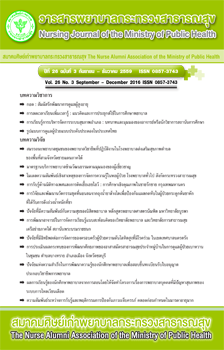โมเดลความสัมพันธ์เชิงสาเหตุของการจัดการความรู้ในหอผู้ป่วยโรงพยาบาลทั่วไป สังกัดกระทรวงสาธารณสุข; A Causal Model of Knowledge Management of Patient Unit in General Hospital under the Ministry of Public Health
Main Article Content
Abstract
การวิจัยครั้งนี้มีวัตถุประสงค์เพื่อศึกษาการจัดการความรู้ในหอผู้ป่วย เพื่อพัฒนาโมเดลความสัมพันธ์เชิงสาเหตุของการจัดการความรู้ในหอผู้ป่วย และเพื่อวิเคราะห์ความสอดคล้องระหว่างโมเดลสมมุติฐานกับข้อมูลเชิงประจักษ์ของการจัดการความรู้ในหอผู้ป่วย โรงพยาบาลทั่วไป สังกัดกระทรวงสาธารณสุข กลุ่มตัวอย่าง คือ พยาบาลวิชาชีพระดับปฏิบัติการที่ทำงานในหอผู้ป่วยโรงพยาบาลทั่วไป กระทรวงสาธารณสุข ทั้งสิ้น 83 แห่ง รวมทั้งสิ้น 408 ราย เครื่องมือวิจัย ได้แก่ แบบบันทึกข้อมูลส่วนบุคคล แบบสอบถามภาวะผู้นำการเปลี่ยนแปลง แบบสอบถามการสร้างเสริมพลังอำนาจด้านจิตใจ แบบสอบถามวัฒนธรรมองค์กรแบบสอบถามการจัดการความรู้ มีค่าความเที่ยงของแบบสอบถามโดยใช้สูตร ค่าสัมประสิทธ์แอลฟ่าครอนบาค ได้เท่ากับ .98 .96 .97 และ .98 ตามลำดับ วิเคราะห์ข้อมูลจากการกำหนดเป็นโมเดลความสัมพันธ์โครงสร้างเชิงเส้น (Structural Equation Modeling: SEM)
ผลการวิจัย พบว่า การจัดการความรู้ในหอผู้ป่วยอยู่ในระดับมาก ( = 4.02, SD = .55) ภาวะผู้นำการเปลี่ยนแปลงมีอิทธิพลทางอ้อมต่อการจัดการความรู้โดยผ่านวัฒนธรรมองค์กร (ß = .56, p< .01) และการเสริมพลังอำนาจด้านจิตใจ (ß = .15, p< .01) นอกจากนี้ยังพบว่า วัฒนธรรมองค์กรมีอิทธิพลทางตรงต่อการจัดการความรู้ (ß = .68, p< .01) การเสริมพลังอำนาจด้านจิตใจมีอิทธิพลทางตรงต่อการจัดการความรู้ (ß = .18, p< .01) แต่ภาวะผู้นำการเปลี่ยนแปลงของหัวหน้าหอผู้ป่วยไม่มีอิทธิพลทางตรงต่อการจัดการความรู้ และโมเดลดังกล่าวสามารถอธิบายความแปรปรวนของการจัดการความรู้ในหอผู้ป่วยได้ร้อยละ 70 จากข้อค้นพบจากงานวิจัยนี้ ผู้บริหารทุกระดับ สามารถนำไปใช้ในการตัดสินใจและกำหนดนโยบายการบริหารการพยาบาลในการขับเคลื่อนการจัดการความรู้ โดยให้ความสำคัญกับการมีภาวะผู้นำการเปลี่ยนแปลง วัฒนธรรมองค์กร และเสริมพลังอำนาจด้านจิตใจ รวมถึงจัดหลักสูตรการอบรมภาวะผู้นำการเปลี่ยนแปลงให้กับพยาบาลวิชาชีพ
A Causal Model of Knowledge Management of Patient Unit in General Hospital under the Ministry of Public Health
Pranee Meehanpong*
Nilawan Ngamkham**
Sontana Mesakulthavon***
Abstract
The purposes of this Cross-sectional research study were to identify and test a causal model of knowledge management. The sample consisted of 408 staff nurses at eighty three General hospitals in Thailand. They were asked to answer five sets of questionnaires: 1) Personal Data Form, 2) Transformational Leadership Questionnaire, 3) Psychological Empowerment Questionnaire, 4) Organizational Culture Questionnaire, and 5) Knowledge Management Questionnaire. Validity of the instruments was assessed with Cronbach’s alpha criteria. The reliabilities were .98, .97, .96, and .98, respectively. Data were analyzed using statistical programs for Structural Equation Modeling: SEM.
The findings of this study revealed that the mean score of Knowledge Management was at a high level ( = 4.02, SD = .55). Transformation leadership of Head nurse had positive direct effects on organizational culture (ß = .56, p< .01) and Psychological Empowerment (ß = .82, ß =.86 p<.01). Organizational culture had positive direct effects on Knowledge Management (ß = .68, p<.01). Psychological Empowerment had positive direct effects on knowledge management (ß = .18, p< .01). Transformational leadership of Head nurse had no effect on Knowledge Management. The model accounted for 70% of the variance in Knowledge Management and a substantial proportion of the variance of the mediating variables.
Article Details
บทความและรายงานวิจัยในวารสารพยาบาลกระทรวงสาธารณสุข เป็นความคิดเห็นของ ผู้เขียน มิใช่ของคณะผู้จัดทำ และมิใช่ความรับผิดชอบของสมาคมศิษย์เก่าพยาบาลกระทรวงสาธารณสุข ซึ่งสามารถนำไปอ้างอิงได้
